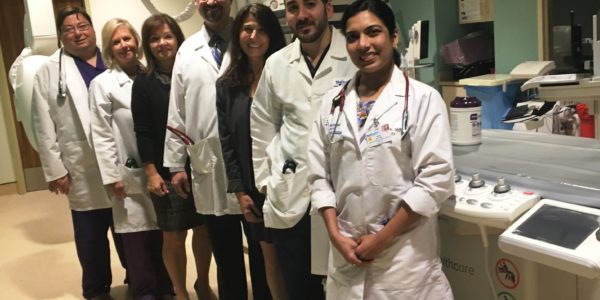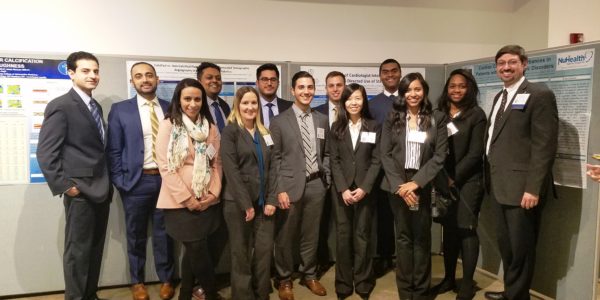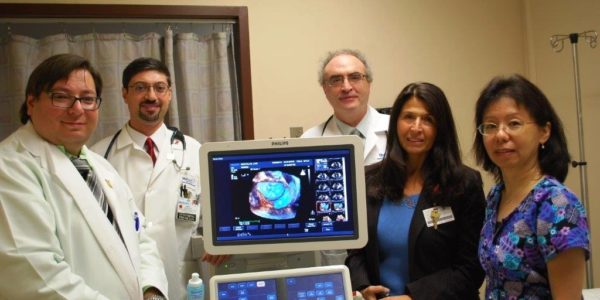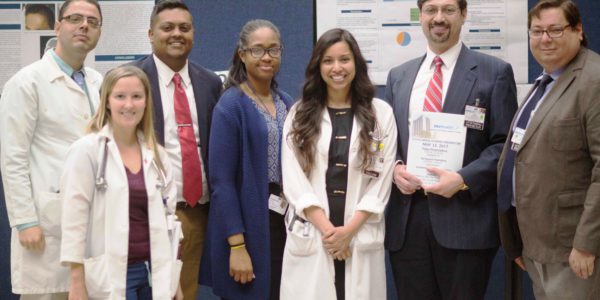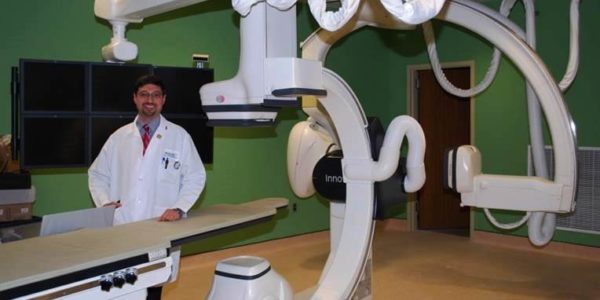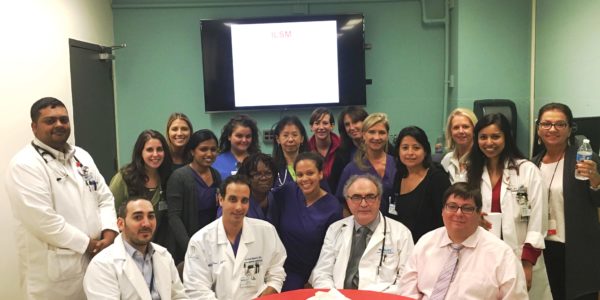Goals and Mission
The NUMC General Cardiology Fellowship Training Program focuses on training leaders in Cardiovascular Disease, who are committed to excellence in academic medicine. The training should not only provide the fundamental skills necessary to enable the osteopathic physician to become an exemplary clinician, scientist, and teacher, but it should instill the utmost respect for the patient, stressing the critical importance of a compassionate and caring doctor-patient relationship. The training program emphasizes the development of particular skills that will foster a lifelong enthusiasm for clinical and/or basic science research that will lead to improved understanding of disease processes, and ultimately, toward advancements in the prevention, diagnosis, and treatment of cardiovascular disease.
The mission of the Fellowship Training Program in Cardiovascular Diseases is to provide an academically and clinically rigorous training program in general cardiology as well as advanced training in clinical cardiology sub-specialties and cardiovascular research. The aims of the program are to provide the trainee with the basic and clinical knowledge, procedural skills, clinical judgment, professionalism and interpersonal skills, and abilities necessary to continue to hone these skills through the course of a long career, as required of a leader in cardiovascular medicine. The curriculum is designed to provide a broad clinical exposure in acute and chronic cardiovascular care occurring in the inpatient and outpatient settings, as well as extensive experience in non-invasive and invasive cardiac procedures. Fellowship training will prepare fellows to function not only as outstanding cardiologists, but also as either sub specialists in a clinical area or investigators in the field of cardiovascular research.
The NUMC program is deeply committed to providing the best training in cardiovascular disease. A standard of excellence is achieved and maintained by strictly adhering to the complying with the ACGME Standards in Residency Training in Cardiology, which is based upon and incorporates the standards and recommendations of the American College of Cardiology. The program is closely maintained by review, audit and input from the program director, attending physicians and fellows.
Program Goals and Objectives
First Year
- Be able to conduct a complete and comprehensive history; especially cardiovascular history and be able to confidently assess the patients’ needs for further testing and treatment.
- Perform a complete and comprehensive physical examination especially of the cardiovascular system, which includes thorough palpation and auscultation of the heart and blood vessels and categorize the cardiac and vascular abnormalities based upon the examination.
- Understand and recognize the osteopathic abnormalities associated with pathology of the cardiovascular system.
- Understand the basic electrocardiogram and be adept at interpreting the vast majority of the electrocardiographic abnormalities that are clinically encountered.
- Recognize the chest radiographic manifestations of diseases of the heart and great vessels and understand the normal structures of the heart and cardiac silhouette.
- Know the indications and usefulness of the echocardiographic and Doppler studies of the heart and be able to recognize the normal structures seen on two-dimensional and M-Mode echocardiography. A fundamental understanding of ultrasound imaging and Doppler flow including color signal definitions should also be attained. The common abnormalities of the echocardiographic examination should also be attained. Perform a hands-on echocardiographic study with attainment of all the views used in the study to degree that it is interpretable.
- Understand the indications, contra-indications and basic interpretations of exercise and ambulatory electrocardiography and arrhythmia monitoring.
- Have a fundamental understanding of the radiopharmaceuticals used in nuclear cardiology and a basic ability to recognize normal and abnormal findings, along with the indications for the various studies.
- Understand the basics of the electrophysiologic examination and its indications and contraindications.
- Recognize the more common arrhythmias and their evaluation and treatments.
- Understand the fundamentals of artificial pacing, its indications and usefulness. Additionally, a basic recognition of pacemaker malfunction; and uses and operation of defibrillators should be attained.
- Understand the indications and contra-indications of cardiac catheterization. And be able to interpret the basic cardiac angiogram and hemodynamic tracings.
Second Year
- Have adequately attained all of the requirements of the first year of training as noted above.
- Perform a highly accurate cardiovascular history such that the diagnostic skills are approaching the accuracy of the attending cardiologist.
- Perform a highly accurate cardiovascular physical examination with the ability to comprehensively determine the presence and nature of any cardiac structural abnormalities and vascular pathology. Recognition of essentially all the murmurs and heart sounds should be mastered
- Interpret with high accuracy essentially all the electrocardiographic abnormalities encountered in clinical practice.
- Perform an exercise stress study independently and be able to provide an accurate interpretation of the findings.
- Accurately interpret any ambulatory arrhythmia study encountered in clinical practice.
- Interpret essentially all of the abnormalities of the echo and Doppler study.
- Interpret most of the cardiac nuclear studies typically encountered in Clinical practice.
- Understand the basic findings of the electrophysiology study. Accurately read most cardiac angiograms. Thoroughly understand the hemodynamics of most of the cardiac abnormalities typically encountered in clinical practice.
- Understand the array of pacemaker parameters and settings used for the cardiac abnormalities encountered.
- Know the indications and usefulness of the transesophageal echocardiography of the heart and be able to recognize the normal structures seen. Recognition of the common abnormalities of the transesophageal echocardiographic examination should also be attained. Perform a hands-on transesophageal echocardiographic study with attainment of all the views used in the study to the degree that it is interpret able.
Third Year
- Have adequately attained all of the requirements of the second year of training.
- Have mastered all of the facts of invasive and non-invasive testing, and clinical findings, and be able to understanding it to a depth that he/she can provide teaching of all of the material at a student and resident level.
- Have completed a scholarly activity.
- Proficiently teach and mentor fellow physicians.
Sample Schedule

Program Administration:
Program Director: Roman Zeltser, MD, FACC
Email – rzeltser@numc.edu
Assistant Program Director: Amgad N. Makaryus, MD, FACC, FACP, FASE, FSCCT
Email – amakaryu@numc.edu
Assistant Program Director: Daniel Chikvasvili MD, PhD, FACP
Email –dchikvas@numc.edu
Program Coordinator: Tabitha Doxsey
Email – tdoxsey@numc.edu
Prerequisite Training / Selection Criteria:
All fellow trainees selected for the cardiovascular disease fellowship training program are required to have graduated from an Allopathic or Osteopathic Medical school and must have completed an ACGME or AOA accredited three year residency program in internal medicine within last 3 years. All fellows must be eligible to be licensed to practice medicine in the state of New York. We do not sponsor Visa Candidates. All applications must be submitted via ERAS, at least 3 LoRs required. We participate in the NRMP match, 2 spots per year
Program Certification:
ACGME and AOA accredited
Upon completion of the Cardiology Fellowship Training Program , fellows will be eligible to sit for the ABIM Certification Exam in Cardiovascular Disease
Faculty Roster
Roman Zeltser, MD- Clinical Cardiology, Program Director
Amgad Makaryus, MD- Echocardiography, Cardiac CT/MRI, Chairman of Cardiology
Daniel Chikvashvili, MD- Nuclear Cardiology
Ofek Hai, DO- Non Invasive Cardiology
Samy Selim, MD-Invasive Cardiology/Vascular Medicine
Kent Stephenson, MD- Electrophysiology
Paul Macarro, MD-Electrophysiology
Lawrence Ong, MD-Invasive Cardiology
Sample of Recent Publications:
- Swarup S, Makaryus AN. Digital stethoscope: technology update. Med Devices (Auckl). 2018 Jan 4;11:29-36. doi: 10.2147/MDER.S135882. eCollection 2018. Review. PubMed PMID: 29379321; PubMed Central PMCID: PMC5757962.
- Wassef B, Kohansieh M, Makaryus AN. Effects of energy drinks on the cardiovascular system. World J Cardiol. 2017 Nov 26;9(11):796-806. doi:10.4330/wjc.v9.i11.796. Review. PubMed PMID: 29225735; PubMed Central PMCID:PMC5714807.
- Makaryus AN, Ismail H, Makaryus JN, Fan D. Geometric comparison of the mitral and tricuspid valve annulus: Insights from three dimensional transesophageal echocardiography. World J Cardiol. 2017 Sep 26;9(9):757-760. doi:10.4330/wjc.v9.i9.757. PubMed PMID: 29081909; PubMed Central PMCID: PMC5633540.
- Makaryus AN, Jauhar R, Tortez LM, Pekmezaris R. Comparison of the Diameters of the Major Epicardial Coronary Arteries by Angiogram in Asian-Indians Versus European Americans <40 Years of Age Undergoing Percutaneous Coronary Artery Intervention. Am J Cardiol. 2017 Sep 15;120(6):924-926. doi:10.1016/j.amjcard.2017.06.018. Epub 2017 Jun 29. PubMed PMID: 28756957.
- Sharma A, Hai O, Garg A, Vallakati A, Lavie CJ, Marmur JD. Duration of Dual Antiplatelet Therapy Following Drug-Eluting Stent Implantation: A Systematic Review and Meta-analysis of Randomized Controlled Trials. Curr Probl Cardiol. 2017 Dec;42(12):404-417. doi: 10.1016/j.cpcardiol.2017.04.001. Epub 2017 Apr 16. Review. PubMed PMID: 29110813.
- Supino PG, Hai OY, Sharma A, Lampert J, Hochreiter C, Herrold EM, Borer JS. Impact of Beta-Blockade on Cardiac Events in Patients with Chronic Severe Nonischemic Mitral Regurgitation. Cardiology. 2018;139(1):1-6. doi:10.1159/000481250. Epub 2017 Oct 18. PubMed PMID: 29041004.
- Kosaraju A, Hai O. Shock, Cardiogenic. 2018 Mar 12. StatPearls [Internet]. Treasure Island (FL): StatPearls Publishing; 2018 Jan-. Available from http://www.ncbi.nlm.nih.gov/books/NBK482255/ PubMed PMID: 29489148.
- Vilcant V, Hai O. Implantable Loop Recorder. 2018 Mar 9. StatPearls [Internet]. Treasure Island (FL): StatPearls Publishing; 2018 Jan-. Available from http://www.ncbi.nlm.nih.gov/books/NBK470398/ PubMed PMID: 29262223.
- Kumar S, Zeltser R, Makaryus AN. Aortic root fibroelastoma causing cardiac ischemia. J Cardiovasc Comput Tomogr. 2018 Jan – Feb;12(1):90-91. doi:10.1016/j.jcct.2017.09.006. Epub 2017 Sep 11. PubMed PMID: 28917492.
- Swarup S, Zeltser R, Druz RS. Going beyond the obvious: Predicting cardiac events in renal disease. J Nucl Cardiol. 2018 Oct;25(5):1674-1676. doi:10.1007/s12350-017-0829-8. Epub 2017 Mar 16. PubMed PMID: 28303475.
- Zeltser R, Tortez LM, Druz RS, Kozikowski A, Makaryus AN, Lesser M,Pekmezaris R. Downstream resource utilization following SPECT: Impact of age and gender. J Nucl Cardiol. 2017 Oct;24(5):1657-1661. doi: 10.1007/s12350-016-0464-9.Epub 2016 Jun 20. PubMed PMID: 27324347.
- Kumar A, Kumar K, Zeltser R, Makaryus AN. Nearly Asymptomatic Eight-Month Thoracic Aortic Dissection. Clin Med Insights Cardiol. 2016 May 25;10:75-8. doi:10.4137/CMC.S38328. eCollection 2016. PubMed PMID: 27257400; PubMed CentralPMCID: PMC4881868.
- Basnet S, Kozikowski A, Makaryus AN, Pekmezaris R, Zeltser R, Akerman M,Lesser M, Wolf-Klein G. Metformin and Myocardial Injury in Patients With Diabetes and ST-Segment Elevation Myocardial Infarction: A Propensity Score Matched Analysis. J Am Heart Assoc. 2015 Oct 22;4(10):e002314. doi:10.1161/JAHA.115.002314. PubMed PMID: 26494519; PubMed Central PMCID: PMC4845135.
- Makaryus AN, Zeltser R, Chikvashvili D, Fan D, Boxt L, Makaryus JN.Cardiovascular Imaging: Current Developments in Research and Clinical Practice. Clin Med Insights Cardiol. 2016 Apr 3;8(Suppl 4):57-61. doi: 10.4137/CMC.S38846. eCollection 2014. PubMed PMID: 27081320; PubMed Central PMCID: PMC4821433.


